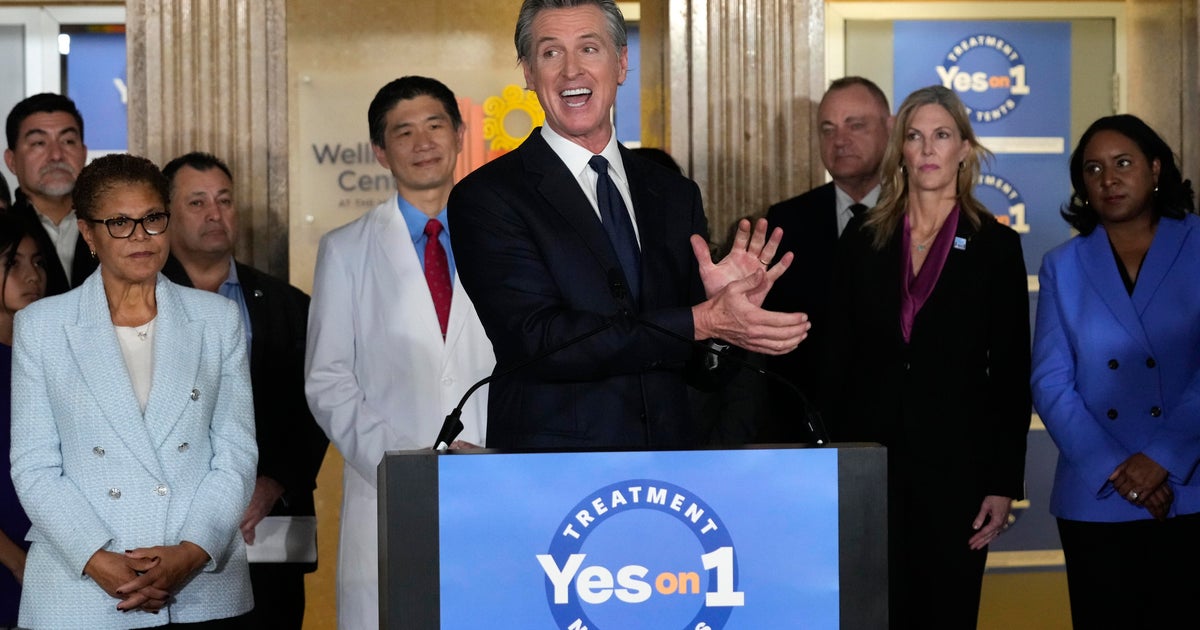CBS News
California voters approve Prop. 1, ballot measure aimed at tackling homeless crisis

A statewide ballot measure aimed at overhauling California’s mental health care system, primarily through the issuance of nearly $6.4 billion in bonds, has been approved by voters.
Proposition 1 is a two-pronged measure backed heavily by Gov. Gavin Newsom and a host of Southland elected officials, including Los Angeles Mayor Karen Bass and county Supervisors Hilda Solis and Janice Hahn. Backers of the measure say that it will dramatically increase access to treatment beds and supportive housing, but opponents claim it would slash funding for already successful programs.
It took more than two weeks for the vote tallying process to be completed, with the officials results being announced on Wednesday.
County officials across California will now be required to redirect money to create drug and mental health treatment beds and bolster their response to lessen the homeless issue that many major cities face.
According to Newsom’s office, the proposition is slated to create 11,150 behavioral health treatment beds across the state, along with housing and 26,700 outpatient treatment slots. Roughly $1 billion of the bond measure is earmarked specifically for veterans.
“This is the biggest change in decades in how California tackles homelessness, and a victory for doing things radically different,” Gov. Newsom said in a statement. “Now, counties and local officials must match the ambition of California voters. This historic reform will only succeed if we all kick into action immediately – state government and local leaders, together.”
What happens now that Prop. 1 passed?
Since Proposition 1 is a bond measure, there will be no immediate impact on taxes. However, California is now slated to take on the new debt proposed in the measure — $6.4 billion — and pay it back with interest.
Additionally, counties will now be required to change some of their mental health care and drug or alcohol treatment services, shifting some of the focus to housing and personalized support services.
The money for Proposition 1 will come in two methods, primarily the issuance of $6.38 billion in bonds and also through a re-apportionment of funds generated by the Mental Health Services Act, which was passed by California voters in 2004, and it imposed a 1% income tax on people earning more than $1 million per year. Funds from that measure are largely directed to counties for mental health programs, but Proposition 1 would give the state control over much of the funding.
The Associated Press suggests that annual revenue from the tax runs between $2 billion and $3 billion a year, providing one-third of the state’s mental health budget.
Counties will be required to spend around two-thirds of the funds on housing and homeless outreach programs for people with serious mental health illness or substance abuse problems.
The bill also authorizes California to borrow more than $6 billion to build 4,350 housing units. Half of the units would be reserved for veterans and add nearly 7,000 mental health and addiction treatment beds.
CBS News
“Sandwiches of History”: Resurrecting sandwich recipes that time forgot

Barry Enderwick is eating his way through history, one sandwich at a time. Every day from his home in San Jose, California, Enderwick posts a cooking video from a recipe that time forgot. From the 1905 British book “Salads, Sandwiches and Savouries,” Enderwick prepared the New York Sandwich.
The recipe called for 24 oysters, minced and mixed with mayonnaise, seasoned with lemon juice and pepper, and spread over buttered day-old French bread.
Rescuing recipes from the dustbin of history doesn’t always lead to culinary success. Sampling his New York Sandwich, Enderwick decried it as “a textural wasteland. No, thank you.” Into the trash bin it went!
But Enderwick’s efforts have yielded his own cookbook, a collection of some of the strangest – and sometimes unexpectedly delicious – historical recipes you’ve never heard of.
Harvard Common Press
He even has a traveling stage show: “Sandwiches of History Live.”
From the condiments to the sliced bread, this former Netflix executive has become something of a sandwich celebrity. “You can put just about anything in-between two slices of bread,” he said. “And it’s portable! In general, a sandwich is pretty easy fare. And so, they just have universal appeal.”
Though the sandwich gets its name famously from the Fourth Earl of Sandwich, the earliest sandwich Enderwick has eaten dates from 200 B.C.E. China, a seared beef sandwich called Rou Jia Mo.
He declared it delicious. “Between the onions, and all those spices and the soy sauce … oh my God! Oh man, this is so good!”
While Elvis was famous for his peanut butter and banana concoction, Enderwick says there’s another celebrity who should be more famous for his sandwich: Gene Kelly, who he says had “the greatest man sandwich in the world, which was basically mashed potatoes on bread. And it was delicious.”
Whether it’s a peanut and sardine sandwich (from “Blondie’s Cook Book” from 1947), or the parmesian radish sandwich (from 1909’s “The Up-To-Date Sandwich Book”), Enderwick tries to get a taste of who we were – good or gross – one recipe at a time.
RECIPE: A sophisticated club sandwich
Blogger Barry Enderwick, of Sandwiches of History, offers “Sunday Morning” viewers a 1958 recipe for a club sandwich that, he says, shouldn’t work, but actually does, really well!
MORE: “Sunday Morning” 2024 “Food Issue” recipe index
Delicious menu suggestions from top chefs, cookbook authors, food writers, restaurateurs, and the editors of Food & Wine magazine.
For more info:
Story produced by Anthony Laudato. Editor: Chad Cardin.
CBS News
The cream of the crop in butter

Watch CBS News
Be the first to know
Get browser notifications for breaking news, live events, and exclusive reporting.
CBS News
Baking an ancient bread in Tennessee

Watch CBS News
Be the first to know
Get browser notifications for breaking news, live events, and exclusive reporting.








